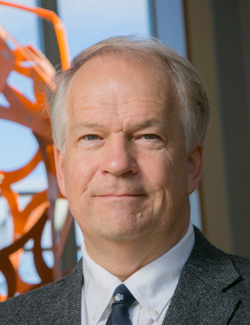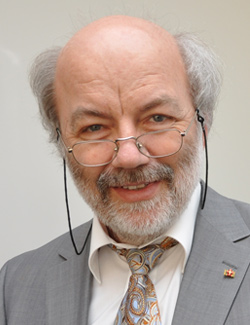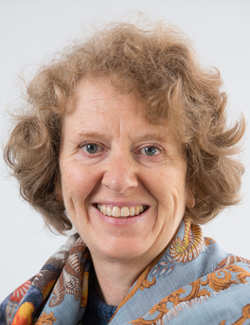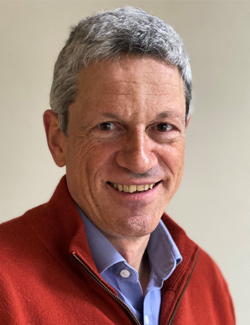The OSA election for the 2022 Vice President and one new Director at Large will open on 21 July 2021. Please read the candidates’ statements and cast your ballot. Instructions for electronic voting will be sent to all eligible voters. If you do not receive voting materials, email voting@osa.org or call +1.202.416.1913.
Polls will remain open until 17 September 2021. Results will be announced at OSA’s Annual Business Meeting on Tuesday, 02 November 2021. They will also be available on OSA’s website in early November. For biographical information about the candidates, visit www.osa.org/osa_election.
Candidates for Vice President

Joseph A. Izatt
Duke University, USA
I am truly honored to stand as a candidate for OSA Vice President. OSA has been my principal professional home since I first joined as a graduate student at MIT in 1986. As a professor at two universities and founder/consultant to optical imaging companies, I have found OSA publications and meetings to be critical venues for the most important developments and interactions in my career.
Through volunteering on more than two dozen OSA councils and committees, my involvement with OSA has resulted in many of my closest professional associations and friendships. In 2010 I was honored to serve as founding editor-in-chief of Biomedical Optics Express, which has become the preeminent journal in this field. On OSA’s Board of Directors from 2016 to 2018, I strongly supported increasing gender equity across OSA leadership. As current chair of the OSA Strategic Planning Council, I work closely with OSA senior leadership and staff to anticipate long-term trends affecting all of OSA’s activities—resulting, for example, in recent expansion of the society’s professional staff presence internationally.
If elected, my priorities would be to:
Ensure that OSA remains a beacon of quality. OSA stands uniquely as the premier global forum for optics and photonics, and has pioneered innovations to improve accessibility through open-access journals and social-media presence. I believe that innovations such as transparent peer review will further enhance the quality and equity of OSA’s scientific content. Recognizing the tremendous effort of OSA reviewers, editors, conference committee members and chairs, and staff, I support innovations to attract, recognize and reward these individuals.
Increase globalization and inclusivity of OSA products and services. The opportunity to participate in in-person OSA activities such as conferences and workshops is challenging for many of our members. OSA’s remarkable effort to turn meetings virtual (and free) early in the pandemic led to a more than doubling of attendance at 2020 meetings, and to greatly increased participation from around the globe. I believe that the still-evolving pandemic experience highlights opportunities to build upon these advances in inclusion, such as new models for hybrid meetings that combine remote and local participation, and adoption of new technologies such as automated language translation and captioning.
Embrace new communities of professionals. Optics and photonics play an increasingly impactful role underpinning modern society, from enabling modern communications systems and solar energy, to emerging applications in autonomous vehicles, quantum computing, ubiquitous sensing and addressing global health disparities. With photonics becoming the new buzzword for opportunity and progress, OSA should welcome this expanding workforce with increased opportunities for (re)training, exchange of information and expertise, and professional recognition.
Enhance OSA’s value to all members. OSA has traditionally excelled at providing career enhancement opportunities for academic and research scientists. To increase the society’s appeal to younger professionals, I will emphasize inclusion of student and young professional members in planning and leadership activities. OSA should pioneer new programs for members in industry that are better suited to their incentives and schedules, including training and certification opportunities. We should increase representation of all of these categories of members in OSA leadership.

Gerd Leuchs
Max Planck Institute for the Science of Light, Germany
I was surprised and honored when I was invited to be a candidate in the upcoming election. OSA has been a home for me during my whole professional life, and I have profited greatly. I felt that it might be time to pay back and serve the community, if this is what a majority wants me to do, and so I decided to run. The following are aspects I will view as priorities if I am elected.
The services best provided by a learned society are scientific meetings and scientific publishing—but also community building and supporting its members in their careers. Openness, inclusivity and embracing all facets of the community are key, and The Optical Society has done outstanding service to the community in the past, always striving to adapt to new developments. The support of women in science, of minorities and of young scientists are topics which OSA has and will continue to focus on.
One project we are currently working on is finding a measure for rating recent publications that is better than just using the impact factor of the journal where the paper appeared. Almost any other measure should be superior to journal impact factor, and if this project were successful, early career scientists would benefit most.
The optics and photonics community, and The Optical Society itself, have become increasingly global, a process that is still continuing. This growth is underlined by the fact that a majority of OSA’s members now live outside of the United States. Currently, this is a challenge and an opportunity for the society, and it would be a focus for me. OSA now has two staff positions in Europe. To be a truly global player, this expansion has to continue. Members in other parts of the world such as South America, Africa and Asia would likewise benefit from a presence of The Optical Society in their countries or on their continents. And The Optical Society will benefit from being more connected to its members.
The dreadful COVID pandemic reminds us of the importance of meetings, and has already taught us that hybrid or fully online meetings do have a value that is higher than some of us had expected. On the other hand, in-person meetings provide opportunities that are missing in online meetings. Therefore, it will be important to put more focus on topical and local meetings. And the society likewise should think about developing new publishing formats.
Last but not least, I would like to see more involvement of scientists working in industry. Hopefully, we will find more formats appealing to this part of our community. In the past, The Optical Society has put substantial emphasis on connecting with members outside academia and this has my full support. Currently, quantum science, related to what some call the second quantum revolution, is bridging over to industry. Quantum science and engineering holds significant promise and is a great opportunity for many of us—and also for The Optical Society.
Candidates for Director at Large

Judith Dawes
Macquarie University, Australia
Light is central to our lives. We are part of a worldwide community of scientists and engineers who do amazing things with light. Light underpins many important technologies and industry sectors—optics and photonics literally connect us to the world.
The COVID-19 pandemic has left its mark on many aspects of our lives. We have become accustomed to online meetings and to virtual modes of connecting. Despite the difficulties, online conferences enable many more people from around the world to participate and to learn, overcoming hurdles due to child care, visas and travel costs. Different models for online conferences are emerging, and I would like to work with OSA staff to identify the most effective ways of holding blended conferences. I am also keen to improve the engagement of students and early-career professionals with the society and with their peers and colleagues around the world. Online mentoring might be one way to help connect people across our global community.
OSA has a proud publishing tradition, but there is always scope to improve—for example, in considering how to make our research accessible to a wider audience. The challenge lies in ensuring that open-access publication is affordable, financially sustainable and of high quality.
In my teaching and outreach activities I aim to promote the understanding of science in the community, so that we as citizens can all make informed choices in our lives. I have spoken about my research and my career to many school students, and my group developed a computer game in which students simulate a virtual telecommunications network. I am keen to support outreach efforts, for example through the OSA Foundation and OSA Student Chapters, to excite young peoples’ interest in science.
We have all seen the power of scientists working with other sectors of society in addressing a global pandemic. My experience with Science and Technology Australia has also shown the importance of science advocacy in policy-making. I would like to encourage the sharing of experiences (and success stories) of science advocacy around the world through OSA’s global network.
I hope for a future in which everyone has the chance to pursue the education and the career that they dream of. I am lucky to have had wonderful role models in my science-interested parents. I believe that programs in support of equity and diversity matter immensely: “If you can’t see it, then you can’t be it.”
I am honored to be nominated as a candidate for the OSA Board.

Thomas Krauss
University of York, United Kingdom
Optics and photonics enable a wide range of applications and underpin numerous industries. As a pioneer in photonic nanostructures, I have witnessed key developments in light emitters, data communications, quantum technologies, photovoltaics, imaging and biosensors, so I have a broad range of experience that allows me to represent the full breadth of the OSA community. In my current role as deputy editor of OSA’s flagship journal Optica, I also feel the pulse of this community on a daily basis, and am excited about supporting it even more strongly if elected as a Director-at-Large. I also have a particular passion for nurturing talent and would love to support many more junior scientists in this role.
In my 25 years of active engagement with the society, I have been fortunate to have served as reviewer and editor, as chair of numerous subcommittees and as organizer of many conferences. I have been proud to support these network-building activities that have been essential to building the vibrant OSA community we know today. We now face the challenge of nurturing this community in a post-pandemic world; junior researchers feel this challenge much more acutely than us “old folks.”
I am very keen to work with the society to embrace new technologies that will allow us to network as effectively as before, yet with a minimal carbon footprint. For example, I have already noticed an increase in international speakers at our local seminars, demonstrating that engagement can become more international even at a time when air travel is severely restricted. We are also exploring novel tools that make virtual networking appear almost natural.
I have witnessed OSA’s exciting transformation from a U.S.-focused organization to a global society, a development I am very keen to support further. I currently have a number of active international research activities around the globe, including in Egypt, Brazil, China and Nepal, so I have a clear sense of research reality both in advanced and emerging economies. I believe that such a global and inclusive exchange of knowledge is essential for breaking down silos, bringing people together and for solving the existential challenges we are facing today.
These challenges range from climate change and water scarcity to food security and global health; we are just coming out of a pandemic that has brought the importance of accurate diagnostics to everybody’s mind. Optics and photonics can make a significant contribution to all of these issues, but only if we work as a global community and only if we fully endorse interdisciplinary thinking. Having initially trained as an optical engineer, I have spent a considerable part of my recent career learning from biologists and talking to clinicians; I therefore have firsthand experience of the importance of interdisciplinary thinking. If elected, I will enthusiastically support interdisciplinarity and ensure that it receives the recognition it deserves.
Thanks to the members of the Nominating Council who prepared the 2021 slate.
Turan Erdogan, Plymouth Grating Laboratory, Inc., USA, Chair
Stephen D. Fantone, Optikos Corporation, USA
Ursula Gibson, Norges Teknisk Naturvitenskapelige Universitet, Norway
Min Gu, University of Shanghai Science & Technology, China
Lenore McMackin, Red Leader Technologies, USA
Ian Walmsley, Imperial College London, UK
Xi-Cheng Zhang, University of Rochester, USA
For further information about the candidates, visit www.osa.org/osa_election.
